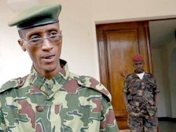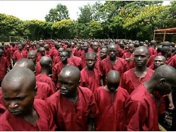DRC President Joseph Kabila Hires Rwandan Presidential Guards After Failed Coup Attempt
Kinshasa, March 20, 2011
Sources in Kinshasa and Kigali tell AfroAmerica Network that the Democratic Republic of the Congo(DRC) President Joseph Kabila has recently increased the number of Rwandan soldiers within his embattled president guard. The decision came after the recent alleged failed coup attempt and the subsequent purge of the congolese military.
According to official version put forward by the Congolese government, on February 27, 2011 a group of soldiers armed with automatic weapons and traditional arms including machetes, amulets, and spears attacked President Kabila’s residence, a military camp and a public TV station in Kinshasa in an attempt to seize power. The attackers were allegedly fought off by the presidential guard after twenty minutes of heavy shooting. Later that day, another group riding motorcycles and flatbed cars attacked another military camp and fled after heavy shooting. The rather sensational version was given by the Minister of Communications and Government spokesperson, Lambert Mende on March 1, 2011.
Contradictory versions about the impact on Joseph Kabila and his escape were given. Some versions alleged that he narrowly escaped the assassination attempt and got away with an injury. This version was fueled by his several days absence from the public just after the alleged coup. A more pervasive version, later reinforced by the government, alleged that he was not home at the time of the attack.
Some who support this last version allege that the attackers were expected, after President Joseph Kabila had been tipped off by Rwandan intelligence services.
What is sure is that coups were shot, soldiers within the presidential guard were killed, and a score of the alleged attackers were killed and others arrested: 126 according to the government.
Immediately after the attack, the DRC government accused the former FARDC General Faustine Munene, who fled to the Congo of being behind the attack (see articles: General Faustine Munene arrested in Pointe Noire, Congo of January 18, 2011 and New Armed Rebellion in DRC Launches by General Fasutine Munene of November 10, 2010)
But the mystery thickened when the Rwandan Minister of Defense, General James Kabarebe flew to Kinshasa, a few days after the attempt. Sources within the office of the DRC security services told AfroAmerica Network that General James Kabarebe, accompanied by Captain Francis Gakwere went to Kinshasa to identify the bodies of the Rwandan soldiers who were killed during the attack.
However, few knew how and why these Rwandan soldiers were there. Investigations by AfroAmerica Network were able to uncover the “pot aux roses” as the French people say.
When Joseph Kabila took power over after the assassination of his father Laurent Kabila by a Rwanda intelligence operative within his presidential guard, he purged all the presidential guard of “unreliable” soldiers, leaving mostly those hailing from the Katanga province, his region of origin. The presidential guard of Laurent Kabila had been recruited, trained and organized by the Rwandan operative Francis Gakwere (see our article Francis Gakwere: Portrait of a Professional Assassin of August 5, 2010 ).
However, as days went by, the division among the soldiers from Katanga appeared, compounded with upheavals in Katanga and Lubumbashi itself and corruption within the security services. Meanwhile, General James Kabarebe managed to mend relations between DRC and Rwanda. One of the selling point was when he pointed out the holes in Joseph Kabila’s security, especially as rumors of coup plots and conspiracies abounded in Kinshasa. He proposed to have Captain Francis Gakwerere do a thorough assessment and come up with a proposal. From the initial proposal, around 30 Rwandan elite soldiers were dispatched to Kinshasa as an advanced squad within Joseph Kabila’s guard. A second phase was to follow, with the aim of created a real force that my preempt any formidable threat. It is when this phase was about to be executed that the alleged coup took place.
The coup attempt accelerated the deployment of Rwandan soldiers in Kinshasa, where they are now in charge of the security of all Kabila’s residences and movements and those of his relatives.
Whether this will reassure Joseph Kabila or not, it appears more and more that he has become dependent on the Rwandan President Paul Kagame.
© AfroAmerica Network, Marc 2011










Comments and Opinions